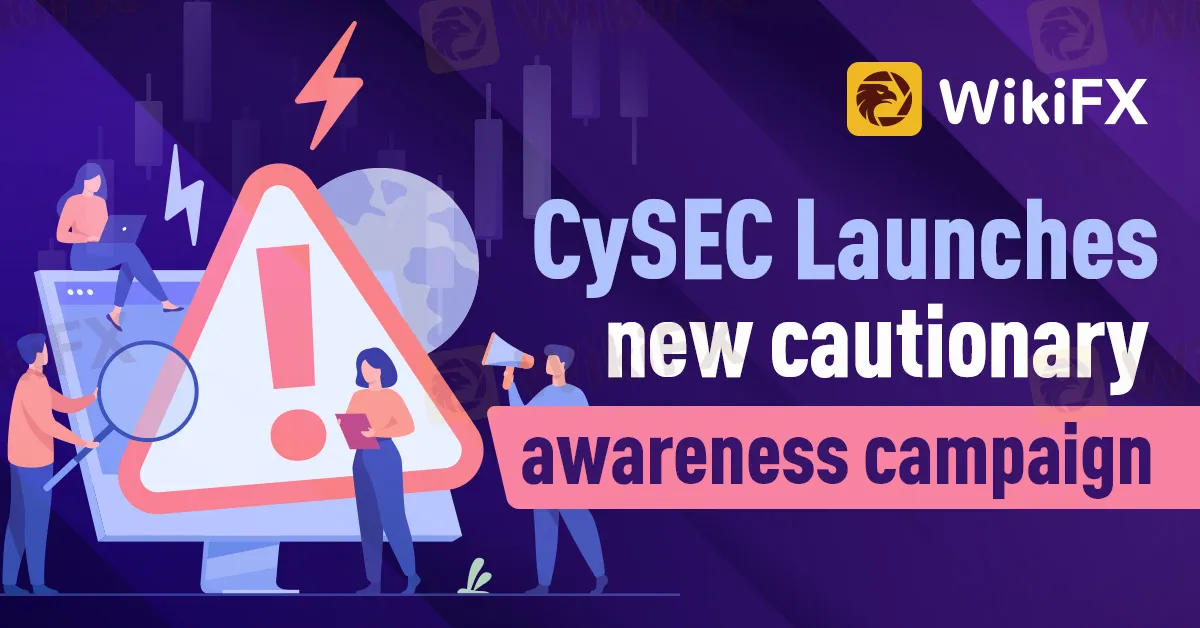简体中文
繁體中文
English
Pусский
日本語
ภาษาไทย
Tiếng Việt
Bahasa Indonesia
Español
हिन्दी
Filippiiniläinen
Français
Deutsch
Português
Türkçe
한국어
العربية
CySEC Launches new cautionary awareness campaign
Abstract:Founded in 2006, the Cyprus Securities and Exchange Commission(CySEC) has proved to be one of the busiest and most informative regulators in the world. Just this Tuesday, the commission began a new campaign aimed at educating investors about investment scams and fraudsters around the world.

Founded in 2006, the Cyprus Securities and Exchange Commission(CySEC) has proved to be one of the busiest and most informative regulators in the world. Just this Tuesday, the commission began a new campaign aimed at educating investors about investment scams and fraudsters around the world.
In addition to protecting investors from social or emotional pressure and the inherent risk of “ Gamification”, the campaign will promote rational reasoning as an alternative, as well as promote market knowledge.
The Cypriot watchdog started the campaign in reaction to the rising number of unsafe and complicated investment “opportunities” that are advertised on social media platforms or other well-known platforms, sometimes too young and inexperienced users who are nevertheless very keen to invest.
The overseer made a statement expressing concern about the rising number of young and inexperienced market participants as well as the explosive growth of social media content pertaining to FX and CFD trading, particularly cryptocurrency. FX and cryptocurrency advertisements “offer sophisticated products that are not necessarily what they seem,” the chairman of CySEC, Dr. George Theocharides, cautions everyone.
On the same note, CySEC wishes to draw attention to the “gamification” phenomenon, which is growing in popularity and refers to the tailoring of investing mechanics to resemble video games in order to make the entire process appear much simpler than it actually is. CySEC expressly denounces these methods. However, CySEC has not yet implemented any real-world gamification strategies.

Disclaimer:
The views in this article only represent the author's personal views, and do not constitute investment advice on this platform. This platform does not guarantee the accuracy, completeness and timeliness of the information in the article, and will not be liable for any loss caused by the use of or reliance on the information in the article.
Read more

XTB Secures Chilean License, Expands Latin America Footprint
XTB gains a securities agent license in Chile, boosting its Latin America presence. The broker plans to offer stocks, ETFs, and derivatives to local investors.

eToro Adds ADX Stocks to Platform for Global Investors
eToro now offers stocks from the Abu Dhabi Securities Exchange, giving global investors access to leading UAE companies in sectors like energy, finance, and healthcare.

Trade War May Escalate, Gold Panic on the Rise
Trump comments on the Russia-Ukraine war, gold rises again to reach a new all-time high.

Rate Cut or Not? It Depends on Trump’s Policies
The Federal Reserve's latest meeting minutes suggest that the decision on whether to move forward with rate cuts depends on the availability of reliable inflation data and the subsequent policies of President Trump.
WikiFX Broker
Latest News
Germany's Election: Immigration, Economy & Political Tensions Take Centre Stage
WikiFX Review: Is IVY Markets Reliable?
IG 2025 Most Comprehensive Review
Construction Datuk Director Loses RM26.6 Mil to UVKXE Crypto Scam
SEC Drops Coinbase Lawsuit, Signals Crypto Policy Shift
Top Profitable Forex Trading Strategies for New Traders
EXNESS 2025 Most Comprehensive Review
ED Exposed US Warned Crypto Scam ”Bit Connect”
New SEC Chair Paul Atkins Targets Crypto Regulation Reform
WikiFX Elites Club —— Fun Spring Camping in Malaysia Successfully Concluded!
Currency Calculator






